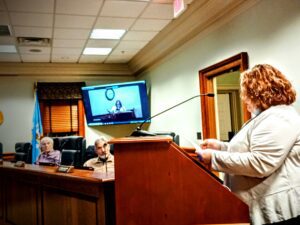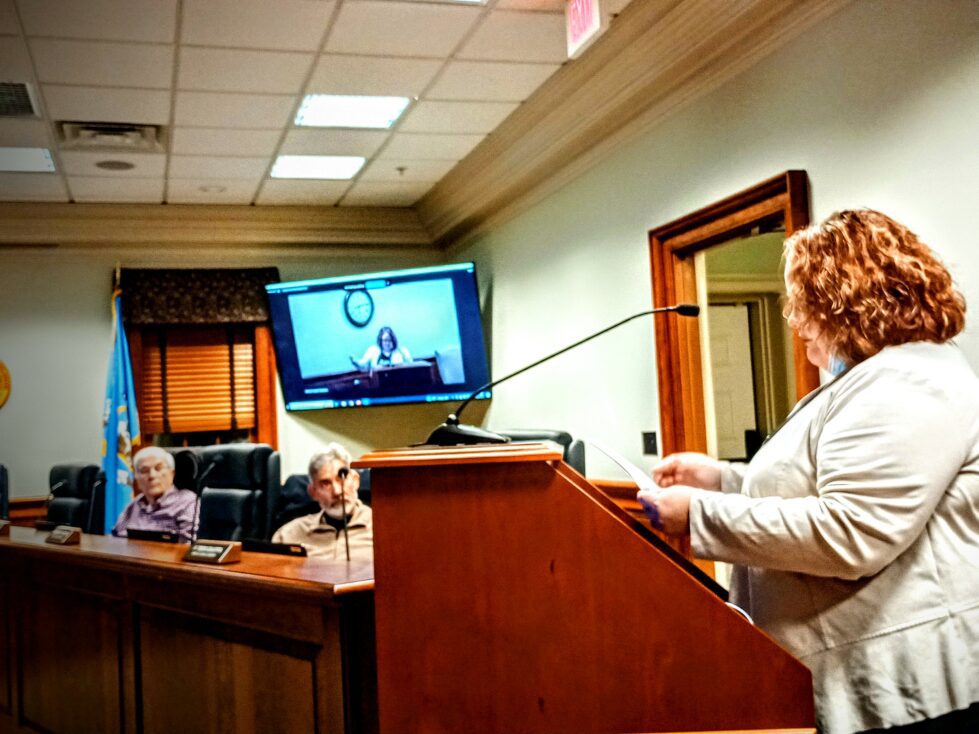

Julie Morris speaks in opposition of Springboard Village while council members Dan Marabello and Andy Fulton listen. Photo by Katie Kazimir.
A decision has not been made on whether to allow a homeless village and will not be made until there is a solid operational plan that does not include taxpayer dollars, Milford’s mayor said this week.
Operating money, and creating a task force to look at the issue, was one of several comments about a proposed village of tiny houses during Wednesday night’s City Council workshop.
The council also heard or discussed:
- Joyce and Mark Nauman, who live just outside town limits, complain that the council had reclassified part of their farm as open space without their knowledge or permission. They thought it had something to do with the council’s plans for expanding parks and bike paths.
- The results of a study about converting the city’s vehicle fleet to electric. It would be possible for about 74% of the city’s vehicles, the study said. Sone vehicles would be too expensive to retrofit and would need to be replaced at the end of their usefulness.
- Interest in the old police station from the Milford Museum as a new home, but warnings from their lawyer that they cannot allow a private purchase until the site had been offered to other government agencies.
City take on the village
Mayor Archie Campbell said he heard things about the city’s involvement with the tiny house village that he couldn’t believe.
“I hear so many rumors. I don’t know why everyone is up in arms and they don’t have the whole story. We’re not going to raise taxpayer dollars to help the homeless,” Campbell said.
“Everyone is out there talking, talking, talking and it doesn’t make much sense. Nothing’s been decided. Everyone needs to stop with the rumors and listen to what the council is saying.”
If the city does decide to go ahead with the project, the public shouldn’t worry about it being downtown, said Council member Daniel Marabello.
“We worked a long time to improve the downtown district,” Marabello said.
“If anything,” Campbell said, “maybe we lease property somewhere.” He reminded the room that two farmers outside Milford offered their property as lease options.
Council Member Jason James suggested forming a task force to create a comprehensive plan for the homeless issue and raise community awareness and understanding of the homeless situation.
Council member Andy Fulton said the city should consider putting the issue on a ballot for direct voter input before deciding which direction to go.
That would have some of the people speaking during the night’s public comment segment.
Any of those decisions are likely to push any official vote on the homeless village beyond the April election.
Public comment on village
Renee Edie told the council that if the city chose to allow the homeless village, it should be on the outskirts of town.
“Lewes wouldn’t allow this. Milton wouldn’t allow it. Neither would Rehoboth,” Edie said. “Why are we doing it? Do something different.”
She said she hoped the council learned to take into account public opinion after the eminent domain case against Annette Billings was dropped last week due to public outcry against the council’s actions.
“Don’t do it because the townspeople are going to come right back at you again,” Edie warned the council.
Social worker Julie Morris said the Springboard Village is not a good idea because the residents won’t have access to adequate medical and mental health services, job opportunities and public transportation are limited, and the village will become a burden for the police force.
“Putting this type of housing here will make Milford more of a permanent location for the homeless,” Morris said. “And if we’re talking about permanent housing and support for the homeless and these populations, I’m all about it. But not this.”
Lucius Webb expressed concern about the village’s ability to address homelessness due to insufficient funding and the ongoing lack of affordable, subsidized housing options for low-income residents.
“Pallet villages are due to fail,” Webb said, “unless there’s a place these people can hope to go to that is affordable.”
The real costs need to be assessed, as did the will of the people, he said.
Farmland conversion
Joyce and Mark Nauman, who live just outside town limits, said they were upset that the city had reclassified their property, apparently for its comprehensive plan for bike paths and parks.
The Naumans, who said they are not against parks, said the city should not have rezoned their property from residential to open space.
“This property is not an open space, it is our home. It’s our farm,” Joyce said. “We do acknowledge that the park and pass system could happen. But it does not need to include our parcel.”
She said the City of Milford did not contact her or her husband, nor inform them of the zoning ordinance details.
“Why would the city pass an ordinance to change zoning without reaching out to us first?” Joyce questioned. “What was their ulterior motive in changing the zoning without notification? The city has automatically devalued our property. And again, you have to ask who benefits.”
Since their property is outside Milford, the couple cannot vote or run for elected town positions, yet their property could be taken by Milford through eminent domain, she said.
“We cannot help but wonder, did the city pass the ordinance to devalue our property in order that they could eventually take it or perhaps other properties. too,” Joyce concluded.
UPDATE: The city changed the future land use of the Nauman’s property to open space in the Comp Plan. No zoning change has been made. The Comp Plan can be changed, but is designed to let the public see how the city wants to see land used in the future.
Electric Vehicles
The results of a consultant study on transitioning Milford’s vehicle fleet from gasoline to electric power over the course of three to 12 years was also discussed at the workshop.
The feasibility study included 100 vehicles and mowers eligible for funding through Energize Delaware, a nonprofit helping governments convert.
Of the 74 light-duty vehicles, three-quarters were identified as candidates for transition to electric vehicles.
The estimated annual fuel costs currently for each gas vehicle is $10,000, while projected fuel for each electric vehicle would be $3,000 per year.
According to the study, if Milford replaced 29 gas-powered vehicles with electric equivalents, the projected savings would be an estimated $75,000 in lifetime costs.
Vehicles identified in the study to have lower total cost of ownership compared to gas or diesel vehicles include Chevy Bolts, Ford F-150 and electric John Deere gators vehicles.
The study found that an electric garbage truck would not be financially viable for electric conversion due to high upfront cost.
To avoid financial burden, replacing gas vehicles with electric ones should be done as each is retired from the fleet, said City Manager Mark Whitfield.
Installing up to 53 charging station ports over 3-12 years to support electric vehicles with dedicated ports for each vehicle would optimize charging, according to the study.
Funding opportunities, such as Energize Delaware grants, could support the addition of electric vehicles to Milford’s fleet with little to no cost.
Old Police Building
The last order of business focused on the town’s plans for the old police department building.
Whitfield said he spoke with staff from the Milford Museum earlier Wednesday about the police building as a possible new location. A tour of the building is scheduled for next week.
Council member Todd Culotta said the council owes it to taxpayers to explore private buyers in addition to public offers.
“I’ve been approached by people who may want to buy it,” Culotta said.
Milford lawyer David Rutt reminded the council that according to Delaware law, the town must first offer the property to government entities before considering private options.
If a government entity makes an offer, Milford is not obligated to accept it, though.
The town should choose the best buyer for the area, Rutt said.
Whitfield said another possibility is for Milford to retain ownership of the property for future city development.
Share this Post



